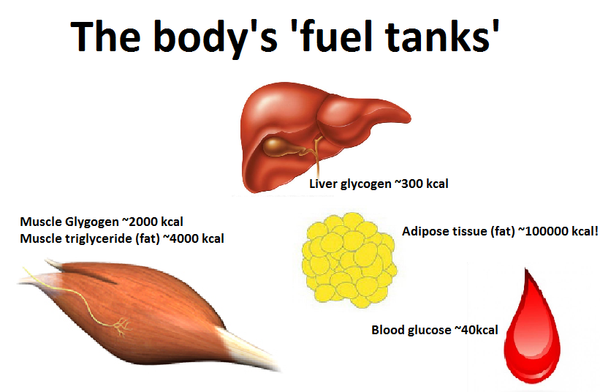Going onto a water fast intervention is not a denial of how fat and carbon are interconnected. In order to lose fat you predominately breathe it out. So hence the question, why do so many people lose so much weight in the first week of going on a diet? And why is it not permanent?
We have all heard the term water weight. Water weight, however, is a bit of a misnomer. When we go onto a reduced calorie diet, especially when combined with a detox program, you are doing two things.
The first is you are reducing salts which are responsible for water retention (excess water) and glycogen storage, which requires between 2-4 grams of water for each gram of glycogen. The second is that your intestines are given an opportunity to flush excess waste from your digestive system. When faced with decreased calories the body takes the path of least resistance and shed the easiest things that can be replenished (water and food).
Neither of these products is muscle or fat. Since they represent a temporary loss, you can expect to gain this weight back when you start to eat ‘normally’ again. In fact, most of the weight you will lose in the first 4-7 days of starting a new diet regime will be this type of temporary weight loss.
True weight loss that burns fat only happens once we start to deplete the stores of glycogen in our bodies. Glycogen is a form of glucose which is stored in the liver and other body tissues. The average person will be able to store about a day’s worth of glycogen for its energy needs.
However, the body can also be tricked into believing that it needs to set-up more reserve when on a reduced calorie diet. If the body never fully depletes its glycogen stores, it starts to think that it needs to build up more capacity. So once you come off a low-calorie diet, not only are you replacing the food waste and water you originally had in your system, you are packing on more weight as part of your muscles, fat, and liver to accommodate the increased glycogen your body thinks you will need for next time.
The result: any amount of overeating goes straight to the new reserves and, even if you have been good for two years or more, you end up putting on more weight than you lost.
To achieve permanent weight loss you need to do two different things: 1) deplete your glycogen reserves completely so as to burn fat, and 2) kill off the cells that allow for increased weight gain. Prolonged water fasting appears to be one of the mechanisms that allow for this to happen.
Since the body holds onto at least a day’s worth of glycogen (and more for those who are obese), unless you are exercising to the point of burning 2000+ calories plus whatever calories you consumed that day, your initial weight loss will never be the result of fat.
Here is an example from the first 4 days of my water fast.
| Day | Mass (lbs) | Mass Loss (lbs) | RVCO2 | Loss Potential | Glycogen+ | Potential Weight | Potential Water Weight |
| 0 | 343.0 | ||||||
| 1 | 336.4++ | 6.6 | 615.2 | 2.7 | 100% | 343 | 6.6 |
| 2 | 333.8 | 2.6 | 610.5 | 2.6 | 66% | 342.1 | 8.3 |
| 3 | 329.6 | 4.2 | 602.8 | 2.6 | 33% | 340.4 | 10.8 |
| 4 | 328.4 | 1.2 | 600.6 | 2.6 | 0% | 337.8 | 9.4 |
+ percentage is just as an example and is not based on researched evidence that glycogen stores declines linearly
++ note that this first day is not representative of starting an intervention of this type as I started after receiving food poisoning, so this loss of weight in the first day is NOT typical.
Notice that the amount of weight loss after day three has declined sharply from the previous days. It is at this point that ketosis has started to fully take over my energy needs and every calorie that is being burned is coming directly from fat. My weight loss potential should max out at 2.6 lbs from this point forward. If I want to burn more than 2.6 lbs, then I need to increase my VCO2 through exercise.
If I were to come off the intervention right now, I should expect my weight to jump back to the 337 lb range as this represents my realistic potential weight after accounting for water weight.
As I continue with the intervention, the water weight I need to worry about putting back on will decline in relationship to my actual weight. It should never go down to zero however. Topping up glycogen reserves after complete deletion will add 2.5 kg (5.5 lbs) of weight regardless of the type of intervention used to enter ketosis.
At this point in the intervention, I have no reason to believe that water fasting is going to magically reduce my weight beyond what my body is capable of based on my VCO2 levels. With the exception of the first couple of days, so long as I remain well hydrated, I should expect to lose between 0.7lb and 2.6lb per day. Anything more than that is an indication of a problem and means I should stop the intervention as soon as possible.
